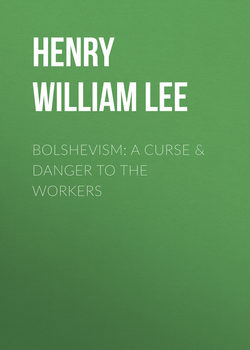Bolshevism: A Curse & Danger to the Workers

Реклама. ООО «ЛитРес», ИНН: 7719571260.
Оглавление
Henry William Lee. Bolshevism: A Curse & Danger to the Workers
FOREWORD BY WILL THORNE, M.P
"BOLSHEVISM":
Отрывок из книги
Russia has given most countries of the world a new word. "Bolshevism" is to-day known universally, though its meaning is not by any means so universal. In Russia it has a very definite and often striking meaning, as many anti-Bolsheviks have known and are learning to their cost. Elsewhere it has a wider, if looser, significance, and is frequently employed to express or describe a number of things to which one objects. Our own Press, for instance, flings "Bolshevik" and "Bolshevism" at everybody and everything that it denounces, or against whom and which it seeks to raise prejudice. In this respect it has often overreached itself, for it is causing some to accept the Russian Bolsheviks at their own estimation, because they know that many of the things styled "Bolshevist" are not as bad as they are made out to be.
In Russia "Bolshevik" means majority, and "Menshevik" minority. Their real significance was purely an internal one for the Russian Social-Democratic Party. It is important to make this point clear, for now and again we come across British supporters of and sympathisers with the Russian Bolsheviks who take the name as a proof that the Government of Lenin and Trotzky actually represents the majority of the Russian people! Nothing is more contrary to the fact. The Bolshevist "coup de rue" of November, 1917, was as complete a usurpation of power as that of Louis Napoleon in 1851. True it was a usurpation by professed Socialists, supposedly in the interests of the Russian working class, but it was no less a usurpation and an attack on democracy which only success in the interests of the Russian working class could possibly justify. The forcible dissolution of the Constituent Assembly by the Bolsheviks two months afterwards, because the elections did not go in their favour, compelled them to take the road to complete domination, and they are now unable to retrace their steps, even if, as is reported, the more honest of them wish to do so.
.....
The terms "Bolshevik" and "Menshevik" (majority and minority) arose from the division in the Russian Social-Democracy which had shown itself at the Congress held in London in 1903. The difference is generally assumed to be one of tactics—of a readiness to co-operate with other parties for certain definite objects under certain special conditions ("Menshevik"), or of complete antagonism and opposition to all other parties every time and all the time ("Bolshevik"). But the difference lies deeper than that. "Bolshevism" is, in effect, the Russian form of "impossibilism." From this the thorough-going Social-Democrats of all countries have to suffer at times. By divorcing the application of Socialist principles and measures from the actual life of the day, and arguing and discussing "in vacuo," impossibilism drives many, who see the utter sterility of its results, into the opposite direction, that of opportunism for the moment without much thought for the future.
Until their "coup de rue" of November, 1917, the Russian Bolsheviks regarded themselves as the extreme Left of the Russian Social-Democratic Party. But latterly they have dropped the name Social-Democrat—so much the better for Social-Democracy—and have adopted that of the "Russian Communist Party"—so much the worse for Communism, for towards Communism the Social-Democratic Commonwealths of the future are bound to tend. "Bolshevism" to-day, where it is honest, is in the main a revival of the Anarchism of Bakunine, together with a policy of armed insurrection, and a seizure of political power which shall install the "dictatorship of the proletariat." That is the dividing line between the Bolsheviks and their Social-Democratic opponents, the Mensheviks, and their far more numerous and powerful antagonists, the Social Revolutionaries, who obtained an overwhelming majority in the Constituent Assembly which the Bolsheviks dissolved by force. The Social Revolutionaries seek the emancipation of the peasants and workers by democratic means—the only safe and sure way—though they were quite ready to use force for the overthrow of Tsardom, happily effected in March, 1917. Unhappily, though, Bolshevik terrorism, with its complete inability to carry out its promises of "peace and bread" for the Russian people, and certain European financial interests are together rehabilitating reaction in Russia, and the people and the peasants may be driven to put up with some new autocratic régime in the hope that it may shield them from the present terrorism and secure them something to eat.
.....